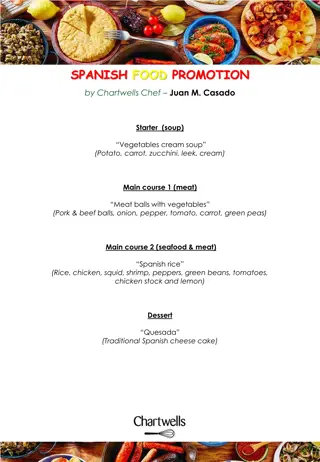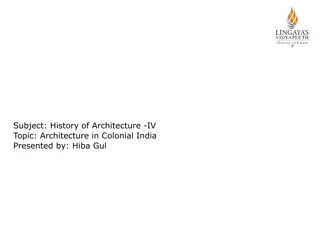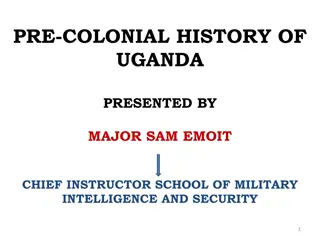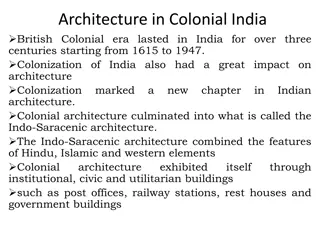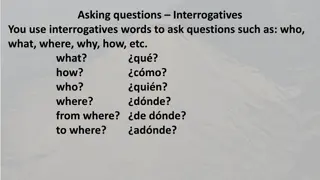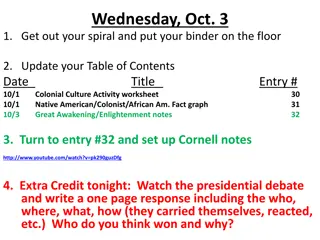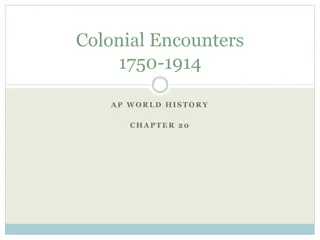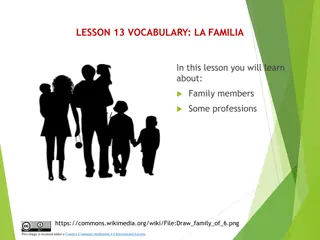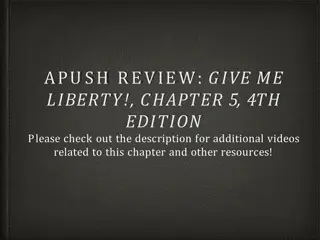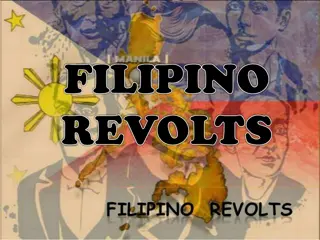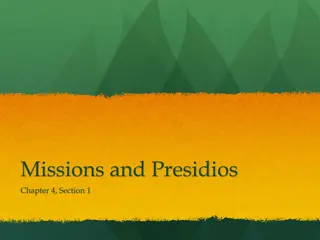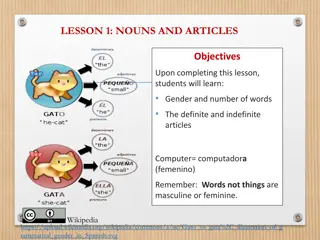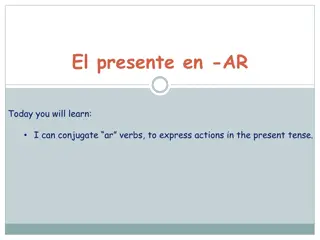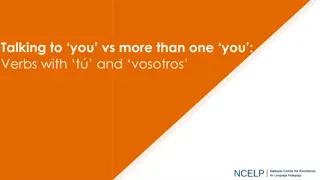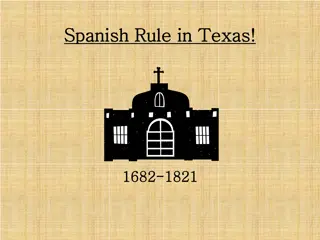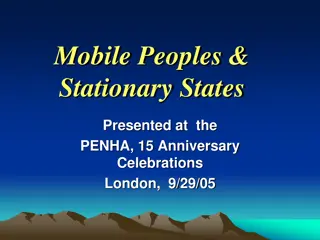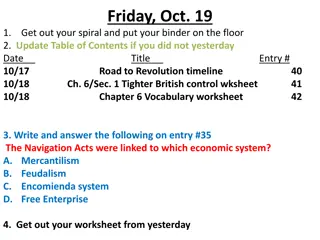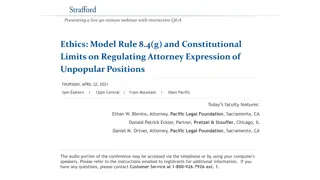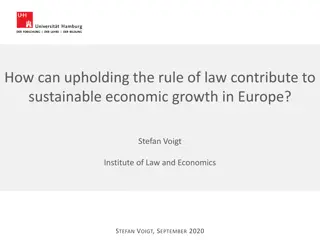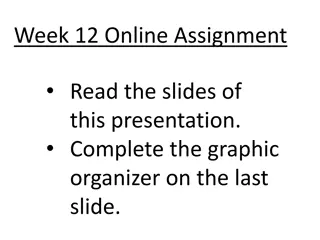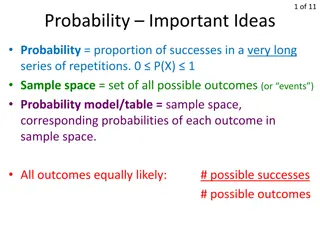Pascal's Rule in NMR Spectroscopy ( n+1 )
Pascal's Rule in NMR spectroscopy, also known as the (N+1) rule, is an empirical rule used to predict the multiplicity and splitting pattern of peaks in 1H and 13C NMR spectra. It states that if a nucleus is coupled to N number of equivalent nuclei, the multiplicity of the peak is N+1. The rule help
1 views • 30 slides
Colonial Acts and Conflicts in American History
Key historical events such as the French & Indian War, the Proclamation of 1763, and the Quartering Act are explored, shedding light on critical laws, conflicts, and tensions that shaped colonial America. The discussion covers acts imposed by the British government, the impact on settlers and Native
5 views • 15 slides
Explore the Vibrant World of Spanish Classes in San Diego
Embark on a journey to master the beautiful Spanish language right here in San Diego with Culture & Language Center. Our Spanish classes in San Diego offer an immersive experience where you'll not only learn the language but also delve into the rich culture and heritage of Spanish-speaking countries
2 views • 7 slides
Spanish Food Promotion by Chef Juan M. Casado
Indulge in a delightful Spanish culinary experience crafted by Chartwells Chef Juan M. Casado. Start with a creamy Vegetable soup, followed by savory Meatballs with a blend of Pork and Beef, and a tantalizing Spanish Rice infused with chicken, squid, and shrimp. End your meal with a decadent Quesada
0 views • 5 slides
Architecture in Colonial India: A Blend of Cultures
British Colonial architecture in India during the 17th to 20th centuries combined Hindu, Islamic, and Western elements, leading to the unique Indo-Saracenic style. This architectural era saw the construction of institutional and civic buildings showcasing a mix of Gothic, Neo-Classical, Indo-Islamic
0 views • 9 slides
Evolution of Medicine in Colonial South Asia
The evolution of medicine in colonial South Asia witnessed a transition from local traditional practices to the dominance of imported European medicine. This shift, marked by the establishment of imperial institutions and training of local physicians in Western techniques, led to a complex interplay
1 views • 5 slides
Language Controversy and Political Awakening in Colonial India
Urdu-Hindi language controversy in colonial India sparked a significant cultural and political divide between Hindus and Muslims, leading to the emergence of the Two-Nation Theory. This controversy, along with events like the formation of the Indian National Conference, highlighted growing tensions
0 views • 45 slides
Understanding Fleming's Left Hand Rule and Electric Motors
Fleming's Left Hand Rule, also known as the Left Hand Rule for Motors, explains the interaction between charged particles and magnetic fields. Electric motors utilize this principle to convert electrical energy into mechanical energy through the interaction of magnetic fields and current-carrying co
2 views • 6 slides
Understanding Uganda's Pre-Colonial History through Major Sam Emoit's Presentation
Delve into the pre-colonial history of Uganda as presented by Major Sam Emoit, Chief Instructor at the School of Military Intelligence and Security. Explore the way ancestral Ugandan communities lived, their tools, social patterns, and interactions before colonial rule. Discover the diverse methods
0 views • 127 slides
Evolution of Colonial Architecture in British India
The British Colonial era in India spanned over three centuries from 1615 to 1947, leaving a lasting impact on the country's architecture. The fusion of Hindu, Islamic, and Western elements gave rise to the distinctive Indo-Saracenic style, showcased in various institutional and civic structures. Exp
0 views • 16 slides
Spanish Interrogatives: Asking Questions and Sentence Structure
Interrogative words in Spanish are used to ask questions, such as who, what, where, why, and how. When forming questions, the verb is placed before the subject in Spanish. Additionally, the placement of interrogatives changes when asking for confirmation or denial. Learn more about asking how much a
0 views • 6 slides
Latin American Revolutions: Causes, Events, and Impact
Latin American Revolutions from 1791 to 1825 marked a period of significant upheaval as colonies in the Western Hemisphere sought independence from Spanish rule. Driven by factors like inspired by other successful revolutions, Spanish mercantilist policies, and unequal wealth distribution, these rev
1 views • 12 slides
Welcome to Colonial Cafe Orientation
Explore the comprehensive orientation agenda at Colonial Cafe, covering essential topics such as company history, mission, job expectations, benefits, and training. Learn about the Cherry System, growth opportunities, and the company's commitment to providing excellent service and quality food. Get
0 views • 28 slides
History of Malaysia: From Pre-history to Colonial Rule
Malaysian history traces back to the migration of Proto-Malays from China, development of trade ports, adoption of Buddhism, Hinduism, and Islam, the rise of the Malacca Sultanate, and European colonial rule by Portugal and the Dutch. The region's rich history is marked by cultural exchanges, trade
0 views • 12 slides
American Colonial History and Representative Government Study Guide
Study guide for American colonial history and representative government covering topics such as Colonial Culture, the Great Awakening/Enlightenment, Ben Franklin, and Roots of Representative Government including Magna Carta, Parliament, English Bill of Rights, Glorious Revolution, salutary neglect,
0 views • 4 slides
Colonial Culture and The Great Awakening: Overview and Impact
This content covers activities and notes related to Colonial Culture, Native Americans, Colonists, and the African American community. It also delves into the Great Awakening and Enlightenment period, discussing the religious movement in the 1730s-1740s. Traveling ministers, such as Jonathan Edwards
0 views • 13 slides
EPA Rule 40 CFR Part 63 Subpart HHHHHH Overview
EPA Rule 40 CFR Part 63 Subpart HHHHHH, also known as The Refinisher Rule, sets standards for hazardous air pollutants in paint stripping and surface coatings operations. The rule aims to control emissions of target hazardous air pollutants in collision centers and surrounding areas. It outlines req
0 views • 20 slides
Exploring the Benefits of Learning Spanish: GCSE Spanish AQA Specification Overview
Discover the reasons to study another language, with a focus on Spanish through insights on cultural awareness, improved memory, career prospects, and more. Dive into the global significance of the Spanish language, assessment details for GCSE students, and the diverse topics covered, from local iss
0 views • 12 slides
European Colonial Encounters 1750-1914: Paths to Imperialism
Second wave European conquests in the 18th and 19th centuries saw a shift towards informal control and military force in establishing empires in Africa and Asia. Various paths to colonial status emerged in India, Indonesia, Australia, and New Zealand, reflecting different colonization methods and ou
0 views • 21 slides
Vocabulary and Professions in Spanish: La Familia
This lesson covers vocabulary related to family members and professions in Spanish. Learn about family members such as madre (mother), padre (father), hijo/a (son/daughter), and professions like enfermero (nurse) and abogado (lawyer). Explore the changing concept of family in Spanish-speaking countr
0 views • 6 slides
The Crisis Begins: Impact of the Stamp Act and Colonial Resistance
The Crisis Begins Chapter from "Give Me Liberty!" discusses the repercussions of the 7 Years War and the end of salutary neglect, leading to new trade regulations and increased taxation on colonists. The imposition of the Stamp Act without colonial consent sparked widespread resistance, with the eme
0 views • 14 slides
Filipino Revolts Against Spanish Colonial Rule in the Philippines
The Filipino revolts against Spanish colonial rule in the Philippines were driven by various causes such as the desire to regain lost freedom, Spanish oppression, hated tribute, forced labor, religious persecution, agrarian disputes, and more. These revolts occurred at different times in various reg
0 views • 15 slides
Understanding Weather Expressions in Spanish Vocabulary
Learn how to use different weather expressions in Spanish, including idiomatic phrases like "Hace calor" (It's hot) and "Está nublado" (It's cloudy). Understand the nuances of expressing weather conditions in Spanish and the importance of idiomatic language. Master key phrases for talking about wea
0 views • 7 slides
Spanish Language Outreach Program for Incarcerated Spanish Speakers
The Spanish Language Outreach Program provides valuable resources and guidance for library staff aiming to better serve Spanish speakers in correctional facilities. Developed in partnership with the Bill & Melinda Gates Foundation, the program focuses on enhancing the skills of library staff to cate
0 views • 68 slides
Texas Mission-Presidio System: Spanish Control Efforts in Texas
Amid fears of losing control to the French in Texas, Spain implemented the mission-presidio system to establish settlements, convert Native Americans to Christianity, and make them loyal Spanish subjects. Friars played a key role in teaching Indigenous peoples about Christianity, Spanish language, a
0 views • 31 slides
Basics of Spanish Nouns and Articles
This lesson introduces the fundamental concepts of gender, number, and articles in the Spanish language. Students will learn about the gender and number of words, definite and indefinite articles, as well as rules for forming the feminine of nouns. The chapter covers the usage of definite articles i
0 views • 7 slides
Mastering the Future Tense in Spanish
Learn how to use the future tense in Spanish to improve your language skills and achieve better grades. Explore the two future tenses in Spanish, the near future structure with "ir + infinitive," and the simple future with verb endings. Practice translating sentences to and from Spanish to strengthe
0 views • 9 slides
Mastering Present Tense Conjugation of -AR Verbs in Spanish
Dive into the world of conjugating -AR verbs in Spanish to express actions in the present tense. Learn about the fundamental parts of Spanish verbs, including the infinitive, ending, and stem. Discover how to conjugate regular -AR verbs like hablar (to speak) through detailed explanations and verb c
0 views • 36 slides
Spanish Verb Endings for Addressing One Person vs. Multiple People
Spanish uses different verb endings for addressing one person (tú) and multiple people (vosotros). This resource provides examples of regular Spanish verbs with endings for one person and more than one person, as well as exercises to practice identifying the correct verb forms. Visual aids and enga
0 views • 21 slides
Spanish Verbs and Opinions Task for Improvement
This independent study task focuses on improving Spanish language skills related to verbs and opinions. Students are required to translate sentences about personal information and express preferences using proper Spanish grammar and vocabulary. The task emphasizes correct usage of verbs in the 1st a
0 views • 18 slides
Exploring AP Spanish Language and Culture: What to Expect and Is It Worth It?
This guide provides insights into AP Spanish Language and Culture, focusing on communication skills, exam pass rates, workload, and the course's value. Discover what to expect, the emphasis on communication skills, exam pass rates, workload breakdown, and whether AP Spanish Language is a worthwhile
0 views • 11 slides
Spanish Rule in Texas: Missions and Presidios
The Spanish rule in Texas from 1682 to 1821 focused on establishing missions and presidios to control the region and counter the threat posed by the French. The missions served to convert Native Americans to Christianity and loyal subjects of Spain, while presidios offered protection. The first miss
0 views • 18 slides
European Colonial Competition in East Africa
The division of African territories by European powers, such as Britain, France, and Italy, led to conflicts and negotiations in the Horn of Africa. Menelik, an African leader, challenged European colonialists, resulting in the famous Battle of Adwa. The aftermath of the battle saw a shift towards n
0 views • 25 slides
Colonial Rebellions and Reactions in Early America
The Colonial Rebellions in early America, such as Bacon's Rebellion and the Stono Rebellion, exemplified the growing tensions and conflicts within the colonial society. These uprisings highlighted issues of class struggle, disparity in social status, and led to significant consequences such as the f
0 views • 7 slides
Colonial Challenges Under British Rule
In this academic material, students are instructed to update the Table of Contents and engage with resources related to tighter British control over the colonies. The tasks include exploring historical events like the Proclamation Act of 1763, Quartering Act, Sugar Act, Stamp Act, Declaratory Act, a
0 views • 18 slides
Ethics & Constitutional Limits on Attorney Expression Webinar
Join the live 90-minute webinar on Ethics: Model Rule 8.4(g) and Constitutional Limits on Regulating Attorney Expression of Unpopular Positions featuring expert faculty members. Explore regulations governing lawyer speech and the requirements for lawyer communication in various contexts. Learn about
0 views • 57 slides
Upholding the Rule of Law for Sustainable Economic Growth in Europe
Democracy and the rule of law are essential for sustained economic growth in Europe. The rule of law ensures stable and impartial enforcement of rules such as property rights and contract law, key for market economies. Upholding the rule of law is crucial for combating corruption and maintaining a f
0 views • 6 slides
Cultural Contrasts in Colonial Texas - Anglos vs Mexicans
The cultural differences between Anglos and Mexicans in Colonial Texas were evident through contrasting perspectives on power structures, military involvement, slavery, and governance. Anglos advocated for civilian rule and believed in the military serving the people, while Mexicans emphasized power
0 views • 6 slides
Understanding Probability: Key Concepts and Rules
Probability is the proportion of successes in a long series of repetitions. Important ideas include the 0-1 Rule, the 100% Rule, the Complement Rule, the Addition Rule, and the Multiplication Rule. These rules govern the calculation of probabilities in various scenarios. Learn the fundamental princi
0 views • 16 slides
Exploring Spanish Citizenship for Sephardic Jews: Language and Culture Requirements
The Law 12/2015 grants Spanish citizenship to descendants of Sephardic Jews, emphasizing language and culture proficiency through exams such as DELE A2 and CCSE. The presentation delves into the impact of Law 1/10/2015, the dissonance between Judeo-Spanish and modern Spanish proficiency requirements
0 views • 40 slides



